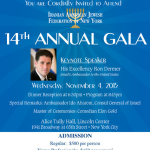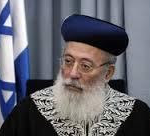Dear Friends;
I hope that you’ll enjoy the following Parsha summary followed by a Dvar Torah;
” Parsha in a Nutshell “
G-d speaks to Avram, commanding him to “Go from your land, from your birthplace and from your father’s house, to the land which I will show you.” There, G-d says, he will make him into a great nation. Avram and his wife Sarai, accompanied by his nephew Lot, journey to the Land of Canaan, where Avram continues to spread the message of a One G-d.
A famine forces Avram to depart for Egypt, where beautiful Sarai is taken to Pharaoh’s palace; Avram escapes death because they present themselves as brother and sister. A disease prevents the Egyptian king from touching her and convinces him to return her to Avram.
Back in the Land of Canaan, Lot separates from Avram and settles in the evil city of Sodom, where he falls captive when a war breaks out in that region. Avram sets out with a small army to rescue his nephew, defeats the four kings, brings back his nephew and all his belongings, plus all the belongings of the defeated kings.
Still childless ten years after their arrival in the Land, Sarai tells Avram to marry her maidservant Hagar. Hagar conceives, becomes disrespectful toward her mistress, and then flees when Sarai treats her harshly. An angel convinces her to return and tells her that her son will father a populous nation. Ishmael is born in Abram’s 86th year.
Thirteen years later, G-d changes Avram’s name to Avraham and Sarai’s to Sarah, and promises that a son will be born to them; whom they should call Isaac (“will laugh”). Avraham is commanded to circumcise himself and his descendents as a “sign of the covenant between Me and you.”
“ Dvar Torah “
The relationship between parents and children is so interesting. At the beginning, a child is so dependent on his parents. The first and deepest terror that we all have as a very young child is separation anxiety: the absence of parents, especially the mother. Young children will play happily so long as the mother is within sight. Absent that, and there is panic. We are too young to venture into the world on our own.
But then it comes a time when we become teenagers and start to enter our adulthood life. It is when we have to learn to make our own decisions in life. At this time, we want to show that we can stand on our own feet and hence we become rebellious. Often there is tension between parents and children at this stage of life.
However, as the years go by, we begin to realise that having spent what seems like a lifetime of running away from our parents, we find that we have become very much like them – and the further away we run, the closer we become. It needs time and distance to see how much we owe our parents and how much of them lives on in us. Towards the end, we want to be with them maybe more than they want to be with us.
In this week’s Parashat Lech Lecha, the Torah introduces us to Avraham Avinu. It begins with the words, “God said to Abraham, Go from your land, your birthplace and your father’s house to a land I will show you”. This is the strangest beginning of any account of a life I’ve ever heard! Why does the Torah start off the life of Abraham from this point in his life?! The Torah gives us no portrait of Abraham’s childhood, his youth, his relationship with the other members of his family, how he came to marry Sarah, or the qualities of character that made G-d single him out to become the founder of monotheism.
With all these questions in mind, it makes me even more curious to know what was the relationship between Abraham and his father? Well, up till now, because of the biblical silence, I used to follow the Midrash which said that Abraham broke the idols in his father’s house. I thought that he was the rebellious child. He was the man of new beginnings who overturned everything his father stood for. He was known to us as “Abraham the Revolutionary”. He was against his father and his beliefs.
But Rabbi Jonathan Sacks says that was not the case. Abraham and his father got along quite well. And the proof is given at the end of last week’s parsha. It says this: “Terach took his son Abram, his grandson Lot, son of Haran, and his daughter-in-law Sarai, and together they set out from Ur Kasdim to go to Canaan. But when they came to Charan, they settled there”. It turns out, in other words, that Abraham left his father’s house long after he had left his land and his birthplace. His birthplace was in Ur, but he only separated from his father in Charan. Terach, Abraham’s father, accompanied him for the first half of his journey. He went with his son at least part of the way. The Torah says that it was Terach who took Abraham, not Abraham who took Terach, from Ur to go to the land of Canaan, which means that Abraham was actually completing a journey his father began. There was no immediate or radical break between father and son.
Indeed it is hard to imagine how it could have been otherwise. Abraham himself was chosen “so that he will instruct his children and his household after him to keep the way of the Lord” – that is, he was chosen to be a model parent. How could a child who rejected the way of his father become a model father? Why wouldn’t his children reject his ways in turn? It makes more sense to say that Terach already had doubts about idolatry and it was he who inspired Abraham to go further, spiritually and physically. Although Terach did not complete the journey with Abraham, perhaps because of the age, but surely he was happy for him that he had followed the words of G-d!
Yes my friends, often we begin by thinking how different we are from our parents, but sooner or later, we come to realize that we are just the same. Sometimes it takes time and distance for us to appreciate how much they helped us become the people we are. Even when we thought we were running away, we were in fact continuing their journey. We often see that a charitable father has charitable children too. People who like to do communal work, probably have parents who did communal work too.
In Judaism, there is no such a thing as a rebellious child. Parents and children are never so much different. We sometimes might have different views in regards to religion, business and lifestyle, but that shouldn’t create a separation between us. Parents and children should inspire each other, and not criticize! The bond between parents and children is always there. All we need to do is to find it……
Shabbat Shalom & Regards;
Martin






You must be logged in to post a comment.